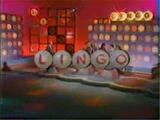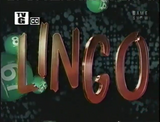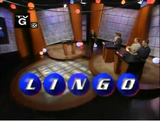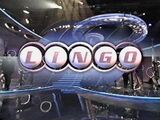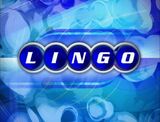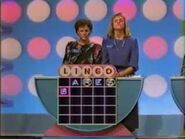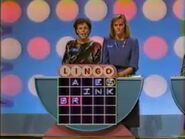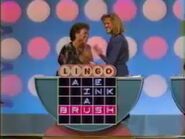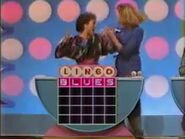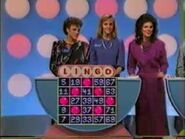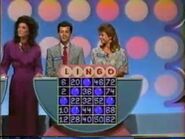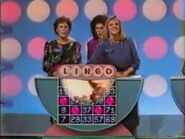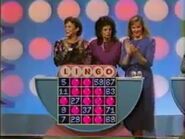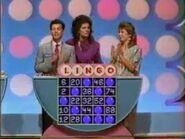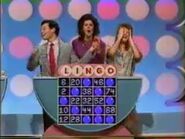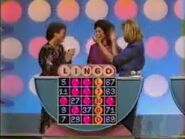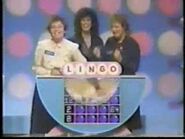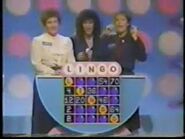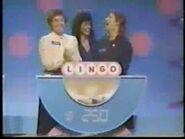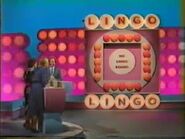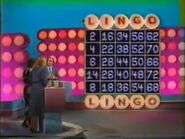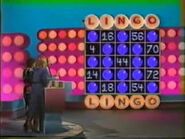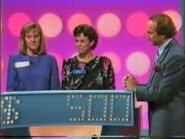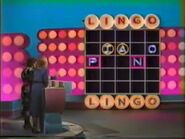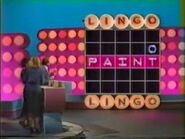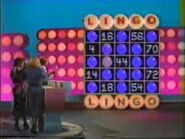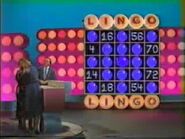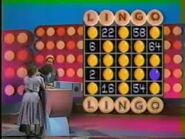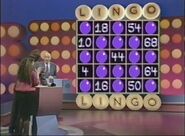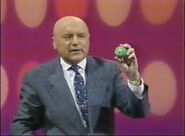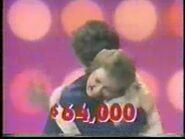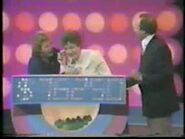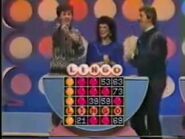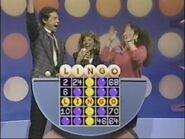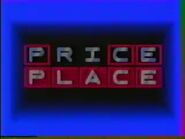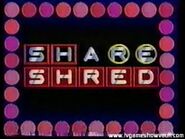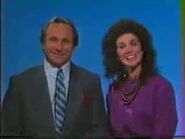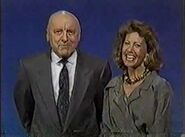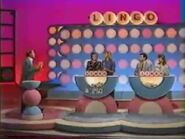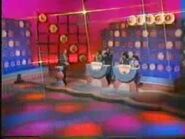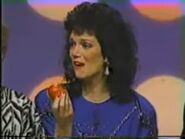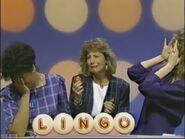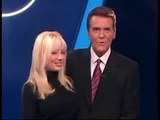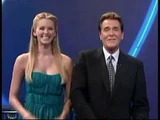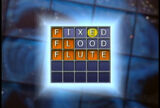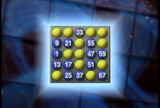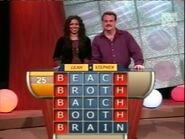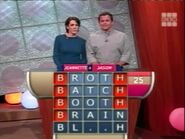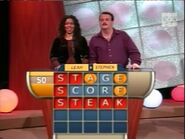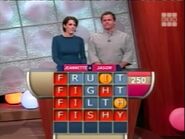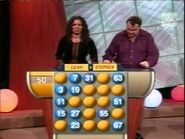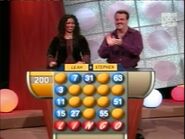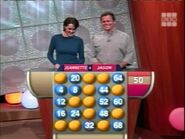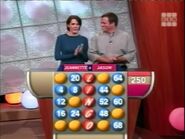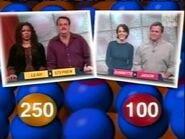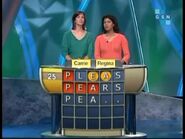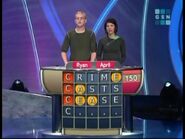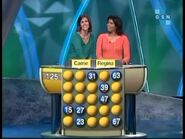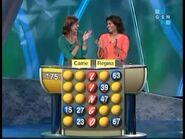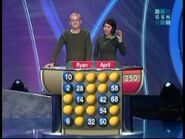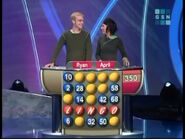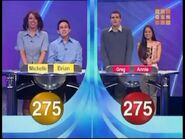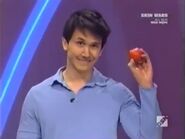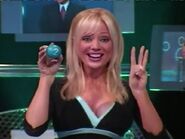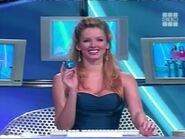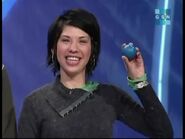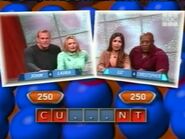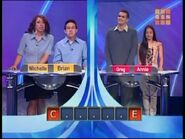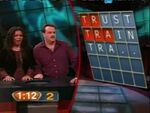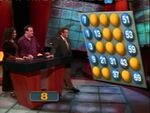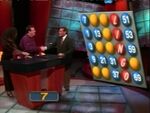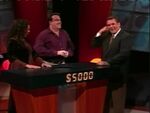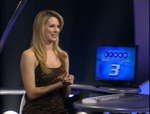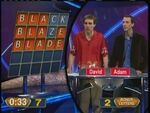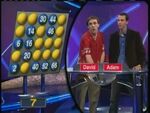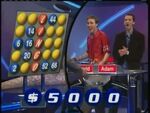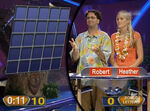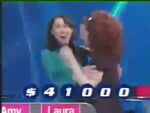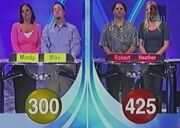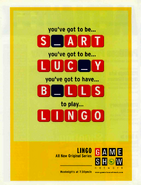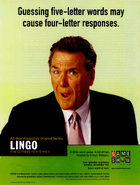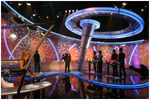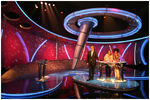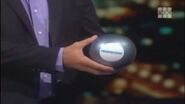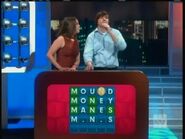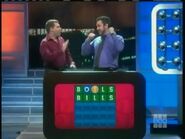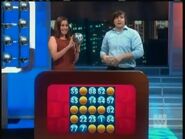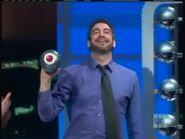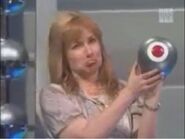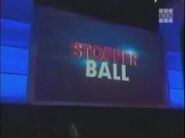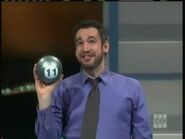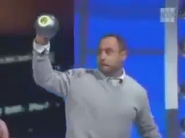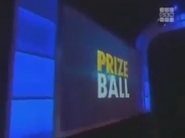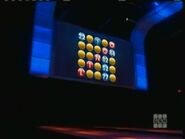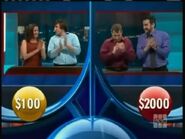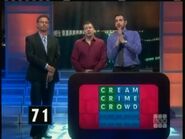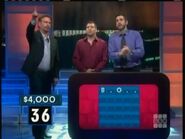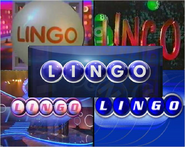| Hosts |
| Michael Reagan (1987–1988) Ralph Andrews (1988) Chuck Woolery (2002–2007) Bill Engvall (2011) RuPaul (2023-present) |
| Co-Hosts |
| Dusty Martell (1987–1988) Margaux MacKenzie (1988) Paula Cobb (2003) Stacey Hayes (2003–2004) Shandi Finnessey (2004–2007) |
| Announcers |
| Randi Thomas (2002–2003) Todd Newton (4/1/2003) Stacey Hayes (2003–2004) |
| Broadcast |
|
Syndication (Daily): 9/28/1987 – 3/25/1988 (reruns aired until 9/1988) GSN (Daily): 8/5/2002 – 6/29/2007 GSN: 6/6/2011 – 8/1/2011 CBS: 1/11/2023-present |
| Packagers |
| Ralph Andrews Productions (1987-1988) Bernstein-Hovis Productions (1987-1988) CCR Video Corporation (1987–1988) Laurelwood Entertainment (2002–2007) IDTV International (2002–2004) Zoo Productions (2011) Triple Brew Media (2023-present) Objective Media Group (2023-present) All3Media (2023-present) RuCo Inc. (2023-present) CBS (2023-present) |
| Distributor |
| ABR (1987–1988) |
Lingo was a game show which is played a lot like bingo, except in order to mark your card, you have to guess a five-letter word within five turns to have a chance.
Gameplay (1987–1988 Version)[]
Two teams of two contestants competed in a game of guessing five-letter words and making bingo or in this case, «lingo».
Main Game[]
At the start of each game, both teams received their lingo cards, each one had seven numbers marked off at the outset. The challengers’ card consisted of odd numbers with each one covered by a red circle, and the champions’ card consisted of even numbers with each one covered by a blue circle.
Now the team in control (with the challengers going first), was shown the first letter of a five-letter mystery word behind their card (generated by the show’s Amiga computer). All the team had to do is to guess the word, then spell it out (contestants on the controlling team took turns while doing that). After each guess, the word was analyzed using red squares and yellow circles around the letters, a red square meant that the letter was correct and in the right position, while a yellow circle meant that the letter was correct but in the wrong position, wrong letters, of course, were letters with nothing around them.
The team lost control if they didn’t guess the word in five turns, guessed a word that doesn’t fit (shorter or longer than five letters), is not a real word, misspell a word, guessed a word that can only be a proper noun, or just plain ran out of time. If any one of those things happened, the opposing team got a shot at the word. When stealing, a free letter was given (in this version it was referred to as a «clue letter»), but if there was only one blank space left, no free letter was given, but the team did get a five second conference (conferring was generally not allowed except in this situation).
Once the word was guessed, the team who solved that word won it, and if the team in control guessed the word on the first try, they won $1,000.
The team with a correct guess, also earned the right to pull out two lingo balls out of a hopper in front of them. Eighteen of the balls were printed with the remaining numbers on the lingo card, while three of them were red balls. If and when a contestant on the controlling team pulled out a number ball, the number was marked off the board; but if a red ball was pulled, the team lost their turn. But if they didn’t pull out a red ball, and if a lingo was not yet achieved, the team took control of the next word.
In addition to the number balls and the red balls, also in the teams’ hoppers were prize balls. When pulled out, the team was credited with the prize and got a free draw. When the show started, there were three prize balls; pulling out one ball was worth $250 in traveler’s checks, pulling out another also played for a trip, and there was also one special ball called the jackpot ball, which played for a Lingo Jackpot which started at $1,000 and grew by $500 for every game in which the jackpot was not won. Later there were only two prize balls in the hopper, one was worth a trip, and the other was the jackpot ball. And finally, offering a trip was no more, but the jackpot was still in play. To win the jackpot that time around, the team had to pull out both prize balls. Prizes pulled out by the team in control were theirs if they won the game.
The first team to make lingo (five in a row) won the game and $250 plus all the prizes credited.
Guessing the Word
Guess #1
Guess #2 — Notice that the circled letters are taken off the board when its put in its proper position.
Word Solved, when solved, the red boxes are filled in.
Here’s a big event, a word solved on the first try!
Making Lingo
The Red Team’s Odd Numbered Lingo Card
The Blue Team’s Even Numbered Lingo Card
The Challenging Red Team drawing a number.
Here’s what the Challenging Red Team’s board looks like so far.
Here’s what the Championship Blue Team’s board looks like so far.
OUCH! Looks like a red ball was drawn!
The Challenging Red Team Lingoed!
The Championship Blue Team drawing a number.
The Championship Blue Team Lingoed!
In the 1st format, winning a game was worth $250.
No Lingo (Bonus Round)[]
The winning team played a bonus round called No Lingo, so called because the object of the game was to not lingo and win a grand cash prize. To start the winning team was shown a lingo card with the even numbers, and sixteen numbers instead of seven were crossed off and arranged in a star shape with the center number (usually the free space spot in regular bingo) left uncovered. The winning team was given house money to start, and then was shown a five-letter mystery word but with two letters revealed at the start (one was as usual the first, and the other was in any one of the remaining four spaces). As always, the team had five chances to guess the word. Conferring was always allowed in this round. Each chance increased the danger of making lingo, because if they guessed the word, they receive the number of draws according to how many chances it took to guess the word, and missing the word entirely earned seven pulls. The hopper in front of the team consisted of all the bingo even numbers (2 though 74) printed on the green balls, plus one very special ball, «The Gold Ball.» On each draw, if the number they drew appeared on the board, that number was covered up, but if the number pulled out was a number not showing on the board, nothing happened and they just simply drew again. If the winning team survived all the pulls without making a lingo, they doubled their cash, and if they pulled out the gold ball, their money was doubled instantly, and the gold ball was put back into the hopper (unlike the green number balls which were always discarded when pulled out).
After each successful round, the winning team could choose to either take the money and quit or continue playing knowing that if at any time a lingo was formed, they lost the money (the winning team even got that option at the start of the No Lingo round, and no team refused to take the challenge). Five words were played in this round, so if the winning team guessed and/or got passed all five words and avoided lingo, they won the maximum grand cash prize. The first trip to No Lingo gave the winning team $500 to start, so winning the No Lingo round was worth $16,000. The second attempt gave the team $1,000 to start making the grand prize $32,000. And making it to No Lingo the third and final time gave the winning team $2,000 to start, for a possible grand total of $64,000. Winning teams stayed on the show until they won three times or defeated once; so the winning team could win up to $112,000 in No Lingo alone.
The No Lingo Round Set
Here’s the board in play for this round.
This may look easy, but it’s not since you’re not supposed to Lingo in this round.
Here’s a $500 stake to start.
The winning team is making a 3rd guess. Notice the top row is blank because they ran out of time on that first one.
Word Solved! Since it was solved in three guesses, the winning team can pull three balls and hopefully not Lingo.
That fading yellow dot on an already covered number is actually sliding down the board by column. That means that the number isn’t there.
OUCH! A LINGO!
DARN! Another Lingo!
1 more ball for $64,000 with perfect situation on the board
OH, COME ON!
Here’s a $64,000 win!
This is the winning team’s grand total. Sadly they would never get their money.
Format Change[]
In later months of the show, the team that won the main game received money according to how they lingoed. Lingoing vertically or horizontally was worth $500, a lingo that went diagonally won $1,000, and achieving a Double Lingo (two lines that were made using the same number) was worth $2,000. That money became the base amount for No Lingo; so Lingoing vertically or horizontally made the grand prize $16,000, diagonal lingos made the grand prize $32,000, and a Double Lingo went for a $64,000 payoff.
WOW! A DOUBLE LINGO!
WOW! ANOTHER DOUBLE LINGO!
Additionally, there was no limit to how many games a team can win. They simply kept on playing until they lost twice.
This version of Lingo died due to the fact that the show was low on dollars and not many contestants were paid because of it. This version did, however, give way to several foreign versions until at last, fourteen years later, Lingo made its American return.
Other Pictures[]
Just a little demo as to how the game is played.
Here’s another but with a different border.
Host Team #1 — Michael Reagan & Dusty Martell
Host Team #2 — Producer Ralph Andrews & Future Set Designer Margaux MacKenzie
The Contestant Area with host’s podium
The 1987 Lingo Set
Gameplay (2002–2007 Version)[]
Chuck & Stacey Chuck & Shandi
Fourteen years later, Lingo was back in a brand new format and veteran host Chuck Woolery at the helm. By Season 3 he was accompanied by a co-host. The co-host would also act as announcer. He had two throughout the series with the first being British-born Stacey Hayes, and the second was former Miss USA and one-time Dancing with the Stars competitor Shandi Finnessey. For a brief period in Season 3, he had a second co-host named Paula Cobb. In Season 2, the announcer was Randy Thomas, the Hooked on Phonics spokeswoman famous for reminding viewers to call 1-800-ABCDEFG.
Main Game[]
Here’s a sample puzzle Here’s what a typical lingo card may look like.
In this version, teams scored points for each word and for each lingo. The game was played in two rounds, and each one ended when time ran out. Winning teams went on to play a bonus round where this time, they did have to make lingo in order to win. The teams were dubbed the Yellow Team on the left and the Red Team on the right, similar to Nickelodeon Arcade.
At the start of the game, both teams received their lingo cards, only this time ten numbers were marked at the outset (they were arranged in a certain way so that only one (sometimes two) row(s), column(s) or diagonal(s) would require two numbers to make lingo, while others required three or four). The Red Team’s card had even numbers and the Yellow Team’s card had odd numbers.
The controlling team still had five guesses to get the word, and failure to solve the word after five tries gave the opposing team what was now called a «bonus letter» (unless there was one letter remaining in the word in which case it was not given), and a chance at the word. The team also lost control if they guessed a word that doesn’t fit, is not an acceptable word (including proper names unless they doubled as ordinary words), misspelled one, or ran out of time.
The team that guessed the word earned points for that word, and the honor to pull out two lingo balls (now colored blue) that are hopefully printed with one of the numbers on their lingo card. Pulling out one of the three red balls still lost their turn (the red balls were referred to by Chuck as «stoppers,» a throwback to his days hosting Scrabble), but not pulling out a red ball or having yet to score a lingo kept their turn and started another word. Each time a team made lingo, they scored double the points of each word and received a new card, but control of the next word passed to the opponents.
Round 1[]
In Round 1, each correct word was worth 25 points, and each lingo was worth 50 points.
Round 2[]
In Round 2, points were doubled. This meant that correct words were now worth 50 points, and lingos were worth 100 points. Plus to help the teams in making lingo, three question mark balls were added to both teams’ hoppers, they acted as wild cards, for whenever a question mark ball was pulled, the team could select any number to cover up, even the ones that caused a lingo (which happened occasionally). When this occurred, the wild-card-replaced number was not removed from the hopper, if it happened to be drawn later, the draw was ignored (for the purpose of game play) and had to be edited out of the show before it was aired.
The team with the most points when time was called in Round 2 won the game and the right to play Bonus Lingo. If the game ended in a tie, a mystery seven letter word was shown to both teams. The first and last letters were given to start, then each new letter appeared back and forth. The first team to buzz-in took a chance to guess, if they were wrong, the opposing team earned another letter and the right to guess, but if the opposing team was wrong, play continued as normal. Later rules had all letters revealed back and forth, both teams buzzing in as many times as they wished, and somehow though not explained, the contestants spelled out the tiebreaker word just like the normal five-letter ones. The first team to guess the word won the game.
Main Game from Season 2
Here’s the yellow team taking one last guess.
Here’s the red team stealing the puzzle.
Word solved by the yellow team.
Word solved by the red team.
31 or 55 for a Lingo.
Yellow team got a Lingo.
32 for a Lingo.
Red team got a Lingo.
The score so far.
Main Game from the Stacey/Shandi Era
Carrie & Regina of the yellow team puzzling over this puzzle.
Ryan & April of the red team puzzling over this puzzle.
Four possibilities
LINGO!
Four possibilities again
LINGO!
Tie Game
Stopper Ball
Stopper ball. There are three of these. Get one, and you lose your turn!
Question Mark/Wild Card Ball
Stacey holding a Question Mark ball plus three fingers to indicate how many.
Shandi holding a Question Mark ball.
Contestant April holding a Question Mark ball.
Tiebreaker
Tie breaker from season two. Notice the tied score.
Tie breaker from season five. The tie was 275 points but it didn’t show for this season.
Bonus Lingo[]
The Bonus Lingo round was played in two parts.
Part 1[]
In the first half, the winning team had two minutes to guess as many five-letter words as they can (five tries for each word as always). On each word two letters were revealed (one was as usual the first, and the other was in any one of the remaining four spaces). Any breakage of the rules explained above only wasted a shot, and failure to guess the word in five guesses caused the word to be revealed and forced the team to move on to the next word. Each correct word was worth $100 and one lingo ball.
Starting in Season 2, if the team was stumped they could call for a bonus letter. One bonus letter was earned for each lingo made during the main game, plus one more for winning the game. Sometimes the bonus letter they called for would complete the word, and it happened on several occasions.
Also starting in Season 2, the team stopped guessing when they solved ten words correctly, for that made it impossible for the team to lose Bonus Lingo. Occasionally, after solving their tenth word, another would briefly appear, as it would have been the next word to contend with had they passed, but the players did not have to guess at this word.
Part 2[]
When the time was up, the winning team was shown another lingo card with a different number of numbers marked off. The winning team used the number of draws to make lingo. Not making lingo won only the money picked up from the first half. Making lingo within the number of pulls won a grand prize, and starting in Season 2, making lingo in one pull won a bigger grand prize.
In Season 1, 13 numbers were marked off the board, they were arranged in an octo-square with a plus sign inside it, so a team could lingo by pulling out four numbers in the diagonals, three in the top and bottom rows and the left and right columns, and only two in the center rows and center columns. The winning team kept the money won from the first part win or lose, but making lingo won a Borders gift card, an Argus digital camera, a Croton watch and a Cassiopeia EM-500 Pocket PC, all totaling $4,000.
Starting in Season 2, 12 numbers were covered and arranged in such a way so that only one row or column could allow a guarantee that a lingo could be made on the first pull. Teams could only win the $100 a word if they didn’t make a lingo. Successfully making a lingo now won $5,000, but making a lingo on the first pull (known as a «Super Lingo») won $5,000 and a trip. For Season 2, the grand prize was a Jamaican vacation package worth more than $10,000. For Season 3, the grand prize was a Harrah’s Entertainment and casino package in Lake Tahoe.
Starting in Season 4, the grand prize for making a lingo on the first pull was bigger cash. For Season 4 only, the grand prize was $10,000. For Seasons 5–6, the grand cash prize was now a progressive Bonus Lingo Jackpot which started at $10,000 and grew by $1,000 for every day it was not won. The largest jackpot won was $41,000.
Season 2 Bonus Lingo
What is this word?
43 for a Super Lingo…
…and they’ve done it!
In addition to the $5,000, this team also won a trip to Jamaica. The total added up to over $15,000, but was not shown on the podium, it was always $5000 or any value from $0 to $1,000.
Shandi Era Bonus Lingo
Shandi, how many bonus letters had our winners?
Dave and Adam just solved their 7th word. Notice that Bonus Lingo is now played at home base rather than the host podium and the board is flipped and put on the host’s podium. The number of bonus letters is also shown.
20 for a Super Lingo.
No Super Lingo, but a regular Lingo for $5,000. With the regular podium now used, the winning graphic is now in the form of flying balls forming the amount.
Robert McKee and Heather Gunn set the Lingo record by solving all 10 words with 0:13 on the clock to spare. Robert is shown here asking «Are there any more words?»
Here’s a sister team who achieved a Super Lingo and won the biggest jackpot in the history of the show: $41,000!
Tournaments and Special Episodes[]
GSN held a tournament of champions with particularly successful contestants from its second and third seasons. Instead of playing Bonus Lingo in the final tournament episode, a third round was played in which points were tripled: words were now worth 75 points and Lingos were worth 150 points. The question mark balls from the second round carried over to the third round. At the end of the show, the team with the most points won the tournament and won a Suzuki Verona for each teammate.
A special episode that aired on April Fool’s Day in 2003 had the entire roster of GSN’s six original show hosts together playing for charity. While Woolery hosted, Mark L. Walberg (Russian Roulette) and Marc Summers (WinTuition) played against Kennedy (Friend or Foe?) and Graham Elwood (Cram), with Walberg and Summers shutting them out 500–0. The sixth host to take part was Todd Newton (Whammy! The All-New Press Your Luck), who served as the show’s announcer/comic relief.
The fourth season featured an entire week of celebrity shows, four of them featuring GSN personalities including:
- Bill Dwyer and Michelle Merkin vs. Zach Selwyn and Dodgy (all from extreme dodgeball, Dodgy being the show’s mascot)
- John Ahlers and Lisa Dergen vs. Kathy Liebert and Kenna James (Poker Royale)
- Kenny Hotz and Spencer Rice (of Kenny vs. Spenny) each team with a contestant playing against each other.
Lingo occasionally featured theme weeks where the set was decorated, the host, hostess, and contestants wore costumes, and the theme music and logo redone in the theme’s style. Themes included Sc-Fi, Fiesta Week and Hawaiian week.
The prize for winning Bonus Lingo varied for episodes in which celebrity contestants competed. In one episode teams received $25,000 for their charity for a first-draw Lingo, while in another the team received $30,000 for completing a Lingo even after the first draw. The prize ranged from $2,000 to $5,000 for celebrity teams who were unable to complete a Lingo in the bonus round. Beginning in the fourth season, celebrity teams received an additional bonus letter.
Internet Players vs. Broadcast Players Tournament of Champions[]
In 2007, a special tournament was held pitting the best contestants who have appeared thus far on Lingo, Robert McKee and Heather Gunn, against the two best contestants paired up from GSN’s online version of Lingo, Mike Mehan and Mindy Harris. The lead changed five times, but in the end Robert and Heather moved on to Bonus Lingo. The prize structure was similar to a regular episode, as this episode aired in order after the jackpot was won on the taping immediately prior, resetting the jackpot to $10,000. Chuck had noted that the gameplay from both teams during this episode illustrated what he saw as the textbook example of how Lingo should be perfectly played.
The 2007 Lingo Tournament of Champions; Robert McKee (of Fort Worth, Texas) and Heather Gunn (of Los Angeles) edge out Mindy Harris (of Ann Arbor, Michigan) and Mike Mehan (of Queens, New York).
Other Pictures[]
Trade Ads[]
Pics of the 2004-2007 set[]
Shandi and Chuck[]
Gameplay (2011 Version)[]
Lingo returned in June of 2011 with comedian Bill Engvall taking charge, and some new format changes.
While the basic format of the front game remained intact, some new changes were made. There were now three rounds, with three, four, and three words played in each respective round. Cash was now awarded for each word; $100 in Round 1, $200 in Round 2, and $500 in Round 3, these were also the amounts awarded for a Lingo. Instead of pulling a ball out of a hopper, the players drew from a rack behind them. The rack consisted of 20 balls: 16 of them had numbers needed on the card, 3 red balls (now referred to as «stopper balls» since they have just a red dot on them), and a ball which was marked with a green dot, if drawn, it awarded the team a bonus prize to keep, regardless of the outcome. Also, before each word, Engvall would give a clue, similar to Scrabble. The team with the most money at the end of Round 3 won the game, kept the money, and advanced to the new Bonus Lingo.
If any teams drew a «stopper ball» from their rack, then the words «STOPPER BALL» (emphasis on the word «STOPPER» in red and the word «BALL» in white respectively) would appear on the video screen in front of them.
In the new Bonus Lingo, the team had 90 seconds to solve five words (no clues). There was no card; just the words. The first word was worth however much money the team earned in the front game, each subsequent word doubled the total, and the fifth word won the team $100,000.
Progressive Shows[]
On shows sponsored by Progressive, one stopper ball was replaced with a «wild ball» with the Progressive logo, and in Bonus Lingo, a bonus letter was awarded on the first word only, except they didn’t call for it; it was given to them on the first guess.
A correct letter in the right place is green instead of red. Yellow circles were still used for correct letters out of place.
Word solved on their 2nd guess.
Notice that there is a mix of even and odd numbered balls. Not to mention that some are higher than 75.
Darn! Stopper ball. Or shall I say the Stopper Eyeball.
Same contestant from the previous picture but this time he holds a number.
There’s a lingo going diagonally.
The team on the right won the game. Cash was played in the main game instead of points.
Almost 20 seconds into the round.
This meant the winning team solved 2 words correctly.
Gameplay (2023 Version)[]
Lingo made its return on January 11, 2023 on CBS, with RuPaul as the host.
Four teams compete, and for the first time, there is no bingo element.
Each word in the front game has a set value. A team has ten seconds to solve each word. For every correct guess the value will diminish. Once the word is guessed, the team in control wins the remaining amount.
Qualifying Rounds[]
Round 1[]
Each team will play three boards. On each board, guessing the word on the first try scores $5,000 (it is classified as a golden guess), while guessing it on the second try is worth $2,500 minus $500 for each subsequent try. Violating said rules mentioned earlier on the page gives the opposing team a chance to steal. If the opposing team gives an invalid guess, play on that word automatically ends.
Round 2: Super Lingo[]
This round is played with two long 10-letter word puzzles. At the start of each puzzle, a big box full of lucky balls descends from the ceiling down to the stage. One side consists of golden money balls while the other contains white number balls. At the start of each word, the team in control of the word will decide which ball from either bin to take. If (s)he takes a gold ball, the amount of the ball (either $100, $500, or $1,000) will be added to the word, and if (s)he takes a white ball, a letter in the corresponding position is revealed for free. Then after that, the puzzle and its clue are revealed. Then letter in the answer pop in one by one. The puzzle starts at $5,000 and diminishes by $500 the longer the play. The team in control can buzz-in at anytime to answer and score the remaining money.
Round 3: Lingo Battle[]
Each team nominates one player to take on two five word boards, leaving the other with the six letter word boards. The twist in this round is that the player in control needs to correctly place a letter to earn another guess, otherwise the opponent will take a turn. The first player to guess the word will again score the remaining amount. Plus all the dollar values are doubled, meaning that each word is worth up to $10,000.
After four words, one last Super Lingo will be played for up to $10,000 and possibly the game. If the game ends in a tie, one final tiebreaker Super Lingo but with no value attached is played.
The two winning teams will compete in a final matchup for $50,000 and the combined total of all the money scored by both teams.
Lingo Showdown[]
The two winning teams will compete in a final showdown called Lingo Showdown. Each team will have two minutes to solve as many five and six letter words as they can with the length of words alternating throughout. The team in control can pass on a word if they get stumped. Each correct word no matter how many guesses it takes scores points. The five letter word puzzles score five points and the six letter word puzzles score ten. If the team gives an invalid guess during this round, the word in play is thrown out and a new word is played. The team with the most points wins $50,000 plus the combined total of both teams.
Other Pictures[]
Rating[]
Music[]
1987 – Jett 88
2002 – Same as the Dutch version — by Robert Etoll, Dean Grinsfelder, and Piet Soer
2003 – Robert Etoll, Dean Grinsfelder, and Piet Soer (The 2002 main still used if a tiebreaker is played)
2011 – Unknown
Inventor[]
Ralph Andrews
Harry de Winter created the revised game format for the 2002, 2003, and 2011 versions.
Trivia[]
Michael Reagan is the adopted son of former President of the United States Ronald Reagan.
On one episode from Season 1, while trying to spell «Approach,» which has eight letters, the board showed «APPPO.» Chuck said, «We’ll do a Max Spell Check on that one!» And on that same episode, the winning team failed to get a single word in Bonus Lingo.
$100,000 was won twice when Bill Engvall hosted the show. Christine and Tamara were the first to win it and Ashley and Jordan won the big cash prize but had more time to spare.
A main game shut-out was achieved only twice during the entire Woolery-hosted run, the first on the GSN hosts episode with Marc Summers and Mark L. Walberg defeating Kennedy and Graham Elwood 500-0. Chuck commemorated it claiming it had never happened in 12 years on the Dutch version (it was achieved only once on the French-Canadian version). The second occurred during the fourth season and to commemorate the event Shandi presented the losing team with two donuts. A shutout never occurred during the Engvall-hosted season.
In 2002, a short-lived GSN original reality series starring Chuck Woolery was originally titled Chuck Woolery: Behind the Lingo (for which the title in itself references the show Woolery formerly hosted from 2002 until 2007). However, the show was later re-titled as Chuck Woolery: Naturally Stoned (for which this title references Woolery’s one-hit wonder song from 1968 of the same name when he was formerly a lead singer of the band Avant-Garde at the time) in 2003.
On February 11, 2022, CBS recently announced that a new version of Lingo (this time based on the current 2021 British version with Adil Ray) with RuPaul as the host and executive producer.[1][2][3][4]The decision to bring it back could’ve been inspired by the web-based word game called Wordle. Casting is currently underway.[5]On May 2, 2022; it has been announced that the British version of Lingo will have an all-star spinoff airing on ITV as Celebrity Lingo[6]hosted by RuPaul as well prior to the upcoming CBS version. On November 14, 2022; according to this press[7]release (courtesy of Paramount Press Express), this version will premiere on January 11, 2023. In addition, the 2023 version aired on the same day as the grocery workers edition of The Price is Right at Night and the third season of Name That Tune with Jane Krakowski.
Before becoming the host/executive producer of the CBS version, RuPaul appeared as a guest on The Price is Right at Night with Drew Carey on May 11, 2020.
RuPaul is the third host to go solo, the first was Chuck Woolery (pre Stacy/Shandi era) from 2002 until 2003 then Bill Engvall in 2011.
This was RuPaul’s second series where he doesn’t appear in drag, the first was RuPaul’s Drag U in 2010 until 2012.
Spin-Off[]
PlayMania – Lingo was part of this show’s lineup of interactive games.
International Versions[]
Countries that have previously aired their versions of Lingo includes:
- Canada (French language only)
- France
- Germany
- Indonesia
- Israel
- Italy
- Netherlands
- Norway
- Poland
- Portugal
- Slovenia
- Spain
- Sweden
- United Kingdom
Taping Locations[]
- BCTV Television Centre, Burnaby, BC (1987–1988)
- Hilversum, The Netherlands (August 2002)
- The Burbank Studios, Burbank, CA (December 2002–2003)
- Ren-Mar Studios, Hollywood, CA (2003–2005)
- Tribune Studios, Hollywood, CA (2005–2007, 2011)
Additional Pages[]
Lingo/Merchandise
Lingo/Catchphrases
Lingo/Letter Combinations
Lingo/Video Gallery
Stopper (Lingo)
References[]
- ↑ CBS ASKS ONE QUESTION — CAN YOU GUESS WORDS? INTERNATIONAL HIT «LINGO» COMING TO CBS IN 2022
- ↑ Lingo Revival Announced for CBS with RuPaul Hosting
- ↑ RuPaul Charles to Host CBS Reboot of Word Quiz ‘Lingo’
- ↑ Hot off Wordle Craze, CBS Reboots Game Show Lingo with RuPaul as Host
- ↑ Lingo Casting
- ↑ Drag Race’s RuPaul to host new gameshow for ITV
- ↑ Paramount Press Express|CBS Entertainment|Releases
Links[]
Official Site of the Current Version
Travis Eberle’s Lingo Page
Jay Anton’s Lingo Page
Lingo Rules @ Loogslair.net
Xanfan’s Lingo Page
Chuck Donegan’s Lingo Page
David Livingston’s GSN Lingo Page
Another Lingo Rules Page
Josh Rebich’s Lingo Page
GSNN Extra’s coverage of the Lingo Tournament of Champions
YouTube Videos[]
The $64,000 win in 1987
The $35,000 win in the GSN version, from 2007
From Wikipedia, the free encyclopedia
| Lingo | |
|---|---|
| Genre | Game show |
| Created by | Ralph Andrews |
| Presented by | Martin Daniels (Original version, 1988) Adil Ray (Regular version, 2021–present) RuPaul (Celebrity version, 2022–present) |
| Voices of | Nick Jackson (1988) |
| Country of origin | United Kingdom |
| Original language | English |
| No. of series | 1 (Original) 3 (Regular) (Revival) 1 (Celebrity) (Revival) |
| No. of episodes | 10 (Original) 115 (Regular) (Revival) 7 (Celebrity) (Revival) |
| Production | |
| Production location | Dock10 (Revival)[1] |
| Running time | 30 minutes (1988) (inc. adverts) 60 minutes (2021–present) (inc. adverts) |
| Production companies | Thames in association with Ralph Andrews Presentations and Action Time (1988) Objective Media Group North (2021–present) Triple Brew Media (2021–present) |
| Release | |
| Original network | ITV |
| Picture format | 4:3 (1988) 16:9 (2021–present) |
| Audio format | Mono (1988) Stereo (2021–present) |
| Original release | 12 May 1988 – present |
| Related | |
| Lingo USA |
Lingo is a British game show based on the American programme of the same name, the original iteration of the programme was made by Thames Television and Action Time for ITV, running for a single series with host Martin Daniels from 12 May to 14 July 1988. A revived version has also aired from 1 January 2021 hosted by Adil Ray.
In the revival version, ITV and Objective Media Group revived Lingo with new presenter Adil Ray. The bingo element has been eliminated in the revival, focusing instead entirely on the word guessing game.[2][3][4] In September 2022, ITV premiered the spin-off Celebrity Lingo, with RuPaul (who is hosting a U.S. revival of Lingo for CBS that is also being filmed in Salford) as host.[5]
Gameplay[edit]
The game is played between teams of two contestants, tasked with solving mystery words. The team in control is given the first letter of each mystery word and receives five attempts to guess and spell the word. After each guess, the team is told whether their guess contains letters that are in the mystery word and whether or not they are in the correct position. The two members of the team alternate taking each guess.
If the team fails to identify the word within five guesses, fails to make a guess within a time limit, gives a misspelt or otherwise invalid word, control is passed to the opposing team and one of the correct letters is revealed.
Contestants who are deaf or hearing-impaired are allowed to have an interpreter on the set, who may interpret between spoken words and sign language. However, the interpreter may not help with solving the words.
Original[edit]
In the 1988 version (which was based on the original U.S. syndicated version), the game was played between two teams. They were each assigned a 25-space «Lingo card» (similar to American bingo) with odd or even numbers respectively with seven numbers on each card already marked. Each word was five letters in length and each correct guess awarded £50. The team would also be allowed to draw two balls from a hopper containing balls with the 18 remaining numbers on the card, two prize balls and three red balls. Drawn numbers were marked off on the team’s Lingo card but drawing a red ball immediately ended the team’s turn and passed control to their opponents. Forming a «Lingo» line of five numbers in a row vertically, horizontally or diagonally awarded a £100 bonus.
The team with the highest score at the end of the game advanced to the bonus round «No Lingo»; the team was given a new card with 16 spaces covered, arranged in a star shape along the diagonals, middle row and middle column (but excluding the centre space). Unlike the main game, the objective was to avoid forming a line of five in a row. The team once again had to solve mystery words (given the first letter and one additional letter) but were required to draw one ball for each guess taken and two more as a penalty if they ran out of guesses. The hopper initially contains 39 numbered balls consisting of the even figures from 2 to 80 (but excluding the ball corresponding to the centre space) and one silver ball.
If the team drew a numbered ball, it was discarded and marked off if it appeared on their card. If the team draws the silver ball, they no longer have to draw any more numbers for the round and the ball is returned to the hopper. After each successful round, the team’s pot is doubled and they are given the option to leave with their winnings or play another round. If the team forms a Lingo at any point, the game ends and the team’s bonus winnings are reduced by half. Up to five rounds could be played, beginning with a base pot of £100 and progressing to the grand prize of £3,200, beginning with the second round, the ball corresponding to the centre space is added to the hopper.
Revival[edit]
The 2021 revival does not use any bingo mechanics and consists only of word guessing in various formats, beginning with three teams:
- Round 1 uses four-letter words worth £200 each. Each team solves four words each (three words each in Series 1), followed by a nine-letter puzzle word (ten-letter puzzle word in Series 1) worth up to £300 but its value decreases as more letters are revealed.
- Round 2 switches to five-letter words worth £300 each. Each team solves three words each, followed by a ten-letter puzzle word (eleven-letter puzzle word in Series 1) worth up to £400 but its value decreases again as more letters are revealed. In this round, failures can be stolen by opposing teams. The team with the least amount of money after Round 1 goes first and the team with the least amount of money at the end of this round is eliminated.
- In Round 3, the one member of each team is assigned to four-letter words and the other member of each team is assigned to five-letter words respectively with each member receiving two words alternately. Each word is worth up to £500 but its value decreases by £50 for each attempt. Both the four-letter word and five-letter word games are followed by an eleven-letter puzzle word (twelve-letter puzzle word in Series 1) worth up to £750 but its value decreases again as more letters are revealed. Again, in this round, failures are passed on to the opposing team. The team with the least amount of money before each of the two games in this round goes first and the team in the lead at the end of this round advances through to the Final.
- In the Final, the winning team has 90 seconds to solve three more words in order to claim their winnings. If the team cannot solve a word, they may pass and receive a new one. The team must first solve one four-letter word to claim half of their winnings, then one five-letter word to claim the entirety of their winnings and then one six-letter word to double their winnings or as of Series 3, at this point, the team is given the option to risk their winnings on a seven-letter word instead of the six-letter word to win a £15,000 jackpot; however, the team may not pass on this one and they lose all of their winnings if they fail to solve the word.
On Celebrity Lingo, the rounds’ values are increased to £500, £750 and £1,000 for words and £750, £1,000 and £1,500 for puzzles (played with eight-letter, nine-letter and ten-letter words respectively). Unlike the civilian version, losing teams receive a consolation prize of £1,000.
Transmissions[edit]
Original[edit]
| Series | Start date | End date | Episodes |
|---|---|---|---|
| 1 | 12 May 1988 | 14 July 1988 | 10 |
Revival[edit]
Regular[edit]
| Series | Start date | End date | Episodes | Notes |
|---|---|---|---|---|
| 1 | 1 January 2021 | 12 February 2021 | 30 | Series 1 took breaks on: 20 January 2021. |
| 2 | 8 November 2021 | 4 February 2022 | 60 | Round 1 started having four words to solve before the puzzle word. The puzzle words started being nine letters in Round 1, ten letters in Round 2 and eleven letters in Round 3. Series 2 took breaks on: 20–24 December 2021. |
| 3 | 2 January 2023 | TBC in 2023 | 50 | The seven letter words for the £15,000 jackpot was introduced. Series 3 took breaks on: 6 February 2023–present. |
Celebrity[edit]
| Series | Start date | End date | Episodes | Notes |
|---|---|---|---|---|
| 1 | 4 September 2022 | 19 November 2022 | 7 | Series 1 did not take any breaks |
See also[edit]
- Wordle
References[edit]
- ^ «ITV gets set to Lingo». Dock10. Retrieved 20 September 2021.
- ^ Harper, Chris (1 January 2021). «New ITV game show Lingo launches with host Citizen Khan’s Adil Ray». BirminghamLive. Retrieved 3 January 2021.
- ^ «Viewers brand GMB host Adil Ray’s new game show Lingo ‘dreadful’ as it leaves them ‘traumatised’«. Entertainment Daily. 1 January 2021. Retrieved 3 January 2021.
- ^ «Adil Ray to Host ITV’s New Game Show ‘Lingo’«. DESIblitz. 1 January 2021. Retrieved 3 January 2021.
- ^ Maidment, Adam (27 July 2022). «RuPaul to film new Lingo TV series in Salford — and here’s how to get tickets». Manchester Evening News. Retrieved 5 September 2022.
External links[edit]
- Lingo at IMDb
- Celebrity Lingo at IMDb
- Lingo at UKGameshows.com
Guess the Word
Guess the Word is a fun vocabulary game for young learners and young teens with a level of A2 (Basic user) on the CEFR.
In this game students read a definition of a word and have to guess what the word is using the letters that appear. This game is a great way to practice reading, spelling and review vocabulary all at the same time. You can also use this activity to prepare Cambridge Flyer level students for the Flyers exam as a similar task appears in the exam though this game is a great game for any group with an A2 or below level.
There are a total 11 categories of vocabulary covering the most common language studied at this level. Can your students guess all the words?
How to Play Guess the Word
-
- Project the game on the whiteboard.
- In teams or individually students have to read the definition and guess what the word is. If they don’t know the word they can buy hints which reveals some of the letters of the word.
- The team that guesses the most words wins!
More Online ESL Speaking Games
Discover more vocabulary activities
.
Vocabulary Games
ESL Say It! – A simple no prep warmer/cooler or quick break for students. In this activity students have to say a word from a category that begins with a letter.
ESL Guess Who – Practice describing people with this fun online game.
MIXUP – A simple quick fire vocabulary game. How many words can you guess in 90 seconds?
Word Wheel – Get class started with this fun vocabulary challenge. In this game students try and guess what the nine letter word is while also making words using the letters and the key letter. The team with the most words and points will win!
Learn to tell the time – Practice reading the setting the time with this fun interactive game to practice telling the time.
ESL Scattergories! – A classic quick thinking vocabulary where students need to think of vocabulary quickly to get the most words beginning with a letter.
Scattagories for Kids! – Now play with young learner and lower level students in this simplified version of our classic game.
Name 5! – Name 5! is a simple no prep vocabulary warmer. In this activity students need to say a number of words based on a range of topics. Can your students beat the clock!
5 Seconds! – Students need to say 3 words from a random category in 5 seconds to score a point.
2 Pictures 1 Compound – Can you guess the closed compounds nouns from the pictures? Practice guessing the compounds nouns with this fun interactive game.
Interactive Board Games – Practice speaking, grammar and vocabulary with these interactive online board games. New board games added regularly.
ESL Vocabulary Fortunes – An online game for teens and adults that is a great way to practice vocabulary on a large number of topics.
Animal Vocabulary Games – Practice animals with these four interactive online games. These fun games are a great way to revise animal vocabulary with your students.
Story Dice – Get your students making and telling stories with this fun online story tool.
ESL Countdown – Practice vocabulary and spelling with countdown.
Anagram Word Game – A simple word game. Suitable for teens and adults with an intermediate and above level of English.
ESL Category Generator – Generate categories to get your students practicing vocabulary. Great activity to be used with a ball or in online classes to get students thinking at the start of class as a warmer.
Trivia Quiz Generator – Generate quizzes quickly with this simple tool. Ideal for teens and adults intermediate and above.
Random Letter Generator – Generate random letters from the alphabet with this simple letter generating tool.
ESL Idiom Generator – Generate over 100 of the most common English language idioms. Get students to draw or mime out the idioms as a way to introduce them to the most common idioms in English.
Random Noun Generator – Randomly generate over 200 of the most common nouns in the English Language. Great for Pictionary and other end of the class coolers.
Catchphrase – A quick fire word game where students explain as many words as they can within the time limit.
Pictionary – Automatically generate words from three different levels of difficulty and play Pictionary with your students in a flash.
ESL Boggle – Boggle is a great warmer that can be used in the classroom. With this online version get students writing words to be the top of the class.
ESL Quizzes – Our Quizzes are a great way to end class and practice key vocabulary for a wide range of themes. Check back regularly as we are adding new quizzes regularly.
Discover games on our Youtube Channel.
A word guessing game taking the world by storm has been compared to 1980s game show Lingo.
Josh Wardle, who lives in Brooklyn and graduated from Royal Holloway, University of London in 2006, created the game Wordle to play with partner Palak Shah.
Having first played the game with Ms Shah, Mr Wardle then shared it with his family on WhatsApp, where it proved so popular that he opened it up to the world.
On November 1, Wordle had 90 players. Last Sunday, more than 300,000 people took part in the daily challenge, with game spreading rapidly on social media.
However, it has now been compared to game show Lingo, which aired in the US and the UK in the 80s. A recent UK revival show has aired on ITV since 2020.
In the game show, Lingo contestants took turns guessing five-letter words.
Similarly, in Wordle, players are invited to guess a five-letter word once a day.
Upon submitting their guess, Wordle tells you whether any of your letters are in the secret word and whether they are in the correct place.
Players are then given six attempts to guess what the secret word is.
Play the game yourself — click here
Wordle is a daily word game puzzle where users have six attempts to guess the 5 letter word. It has been compared to a 1980s game show
Wordle has been compared to 1980s game show Lingo. In the game show, Lingo contestants took turns guessing five-letter words in a grid similar to Wordle’s
A 2020 reboot of Lingo starring Adil Ray has also been described as looking similar to Wordle
Josh Wardle created the game for his partner before opening it to the public. It is now played by hundreds of thousands
Lingo aired in the US and the UK in the 80s. A recent UK revival show has aired on ITV since 2020
ITV’s relaunched Lingo — hosted by Adil Ray- sees three pairs of contestants try to work out words appearing in grids and puzzlewords.
The Lingo computer gives them the first letter of words of different lengths — and they can cash in if they can guess the full word correctly.
Fans were quick to point out the similarities between Wordle and Lingo.
One wrote: ‘Is there any connection between Wordle and the TV quiz show Lingo? Or it is just a massive coincidence that they are exactly the same, right down the choice of colours?’
Another said: ‘So this Wordle thing everyone’s doing, it’s just Lingo, right? Someone just stole Lingo and made it an app?’
While a third added: ‘Hold up. So this Wordle thing I keep seeing recently is actually just Lingo?’
Wordle creator Mr Wardle, a former software engineer for Reddit, created a similar prototype in 2013 but abandoned it after friends were unimpressed.
How does Wordle work?
- Players visit the Wordle website everyday to try and guess that day’s five letter word.
- You are given six turns to guess the word.
- After each guess, correct letters in the right place turn green, while correct letters in the wrong place turn yellow.
- Any letters that turn grey can be ignored as they are not in the word.
- Players are able to share their attempts on social media in the form of coloured grids.
- There is just one Wordle per day.
However, during the pandemic, he revisited the game, after he and his partner ‘got really into’ the New York Times spelling bee and daily crossword.
It is not the first time that Mr Wardle has created something that has caused a storm online.
In 2015, he created Reddit’s The Button, a bizarre game where a button appeared on a website with a 60-second countdown.
Every time someone pressed the button the clock would reset, but each person could only press it once. Despite there being no prize for clicking it, the simple reward of being able to press it saw millions of people click it.
He is also the creator of Place, a collaborative social experiment that caused waves in April 2017.
Place was a shared online space that allowed users to fight over what was drawn there.
It resulted in huge, sprawling communities battling over space on an online canvas.
Now based in New York, Mr Wardle says he enjoys ‘building unique products that focus on human interaction’.
Ms Shah says she now wakes up every day to play Wordle. Though it is now shared with the world, she said she appreciated that Mr Wardle originally created it for her.
‘It’s really sweet,’ she said. ‘This is definitely how Josh shows his love.’
Mr Wardle graduated Royal Holloway, University of London in 2006 after studying Media Arts. He then studied Digital Arts at the University of Oregon.
His education was followed by two years as an artist for Reddit, before becoming a senior product manager and later an adviser for the company.
Mr Wardle spent nearly two years as a software engineer for Pinterest before returning to Reddit in the same role in January 2020.
Discussing the success of Worlde, Mr Wardle, told The New York Times: ‘I think people kind of appreciate that there’s this thing online that’s just fun. It’s not trying to do anything shady with your data or your eyeballs.’
Josh Wardle, who lives in Brooklyn and graduated from Royal Holloway, University of London in 2006, created the game Wordle to play with partner Palak Shah
Having first played the game with Ms Shah, Mr Wardle then shared it with his family on WhatsApp, where it proved so popular that he opened it up to the world
Wordle is a daily word game puzzle where users have six attempts to guess the 5 letter word
Hundreds of thousands of fans are playing Wordle – in which the aim is to guess a single five-letter word known as the ‘Wordle’ within six attempts
Today’s Wordle, ATTEMPT ONE: For the first effort, we tried the word SHORT, discovering that S was the first letter of the Wordle
ATTEMPT TWO: We tried the word SMALL, only to discover that none of the other letters were in the word
ATTEMPT THREE: The word SIZED told us that I was the second letter of the Wordle and that it also had an E
ATTEMPT FOUR: Trying the word SINCE didn’t unveil any new letters — but it did tell us that the Wordle ended with an E
ATTEMPT 5: Knowing it began with an S and I, ended with an E and with several other words ‘greyed out’ and removed, on the fifth try, our guess of SIEGE proved to be correct
He added that the game also attracts players because it takes up just three minutes a day.
Mr Wardle said: ‘It’s something that encourages you to spend three minutes a day. And that’s it. It doesn’t want any more of your time than that.’
His partner was the first player to play the game and played a key role in getting it ready for the world
Wordle’s initial list of all of the five-letter words in the English language — about 12,000 — contained obscure words the couple thought would have been near impossible to guess.
Mr Wardle eventually narrowed the list of Wordle words to about 2,500, which should last for a few years.
However, fans have already complained about some words, saying that the words REBUS and TAPIR were not familiar enough.
10000+ результатов для ‘guess the game’
Guess the word game
Найди пару
от Denislashenkov
Guess the place game
Случайные карты
от Bestteacherever
Guess the word (A2) 1-3
Сопоставить
от Marikulish
0-100
English
Vocabulary
Elementary A2
Guess the word
SM3 Game Guess the object
Случайные карты
от Annamaiboroda
Guess the word (A2) 1-6
Найди пару
от Marikulish
English
Vocabulary
Elementary A2
Guess the word
Ice Breakers
Warming up
KB2 U7 guess the animal speed game
Найди пару
от Annazolotareva3
Select a synonym for the bolded word 1
Сопоставить
от Marikulish
0-100
English
Vocabulary
Guess the word
Ice Breakers
Reading Comprehension
Synonyms
Warming up
Guess the word (A2) 1-5
Сопоставить
от Marikulish
English
Vocabulary
Elementary A2
Guess the word
Ice Breakers
Warming up
Guess the word (A2) 1-4
Сопоставить
от Marikulish
0-100
English
Vocabulary
Elementary A2
Guess the word
Ice Breakers
Questions
Warming up
Prepare A2L2 U1 (guess the game)
Флэш-карты
от Ivoilovap
The truth game
Случайное колесо
от Mironova2
The Business
Guess the animal?
Откройте поле
от Welcometeam
Super Minds 1
GUESS game
Викторина «Игровое шоу»
от Mariavladm
Guess game
Случайные карты
от Svkananda
Guess game
Случайные карты
от Sofiaenglishplus
Read & Complete 1 — Animals (Easy)
Случайные карты
от Marikulish
0-100
English
Vocabulary
Easy
Funny
Guess the word
Ice Breakers
Kids
Reading Comprehension
Speaking
Warming up
Guess the word (A2) 1-1
Сопоставить
от Marikulish
0-100
English
Vocabulary
Elementary A2
Guess the word
Questions
Warming up
GW5_superlative_Sea_Which _ is the smallest?
Викторина
от Misslena
Guess What 5
Guess the word (A2) 1-2
Сопоставить
от Marikulish
0-100
English
Vocabulary
Elementary A2
Guess the word
Questions
Warming up
Guess the Hobby
Викторина с изображением
от Mkurkova1
Guess the country
Найди пару
от Riniakina
Beginner
Elementary
teenagers
children
Adults
English
Fly High 3
Fly High 4
metro starter
Guess What! 4 Unit 7 Buildings Put the words in order.
Привести в порядок
от Carnation2000
Guess What 4
3B — Guess the job
Случайные карты
от Belankahelen
English File elementary
Guess the cartoon
Викторина с изображением
от Demmary
Guess the Daily Routine
Случайное колесо
от Kasatik94
Guess the food!
Случайные карты
от Arisha2103
teenagers
adults
English
food vocabulary
Guess the movie
Викторина
от Brisa1803
Guess the scene
Викторина
от Irene68
Films
GW6_U2_good-better-the best
Викторина
от Favteacher
Guess What 6
Guess the animal
Викторина с изображением
от Gorobets
Guess the room name
Сопоставить
от Lidia59
Compact
Furniture
Spotlight 7
Spotlight 8
Guess What 5 adjective unit 1
Откройте поле
от Tashanova77
Guess What
Guess the animal
Викторина
от Natalysergeeva
Cl 8-1. At the bottom. New phrases. Guess game
Викторина с изображением
от Lujeniaspb
Copy of Prepare A2L3 U9 (guess the game)
Флэш-карты
от Ivoilovap
Guess the country
Найди пару
от Prussiate09
Spotlight 4 Guess What4 Unit 5 Food
Анаграмма
от Carnation2000
4-й класс
Guess What 4
Spotlight 4
Guess the Animal
Случайные карты
от Maiyakushko
3 класс
4-й класс
Animals
English
Guess the book
Откройте поле
от Polinakordik
Guess the shadow!
Угадай буквы
от Berdmary96
guess the vegetable
Викторина с изображением
от Mrspavlovaon
Verbs quiz
Викторина
от Tashanova77
Action verbs
Guess What
Guess the missing word
Пропущенное слово
от Zhannnap
Guess the places
Откройте поле
от Bobriakov
guess the food
Откройте поле
от Nirovulf
animals (Guess who game)
Сопоставить
от Zavershinskaya1
Guess the animal!
Викторина «Игровое шоу»
от Rockmasha
Guess the animal
Викторина
от Mkurkova1
Guess the rhyme
Сопоставить
от Yelena
Starlight 4
Guess the film
Откройте поле
от Kseniateacher20
guess what game
Случайные карты
от Alsshf
Guess What! 4 U7 Buildings
Диаграмма с метками
от Carnation2000
Guess What 4
Eyes Open 2 Unit 5 guess the words
Привести в порядок
от Amarga
eyes open 2
Guess What Unit 4 Rooms (vocab set)
Совпадающие пары
от Rdinkvalev
English
Guess What 2
Weather: guess the word
Анаграмма
от Ekaterinaganeev
English File Third Edition Elementary 5C
Guess the symptom
Случайные карты
от Vvaleria
Guess the container
Викторина с изображением
от Solaris437
A1 Level
English
Today Level 2
Guess the country
Викторина с изображением
от Annettedelacroix
guess the body parts
Откройте поле
от Kgaboeva
Guess the food idiom
Откройте поле
от Olefir150295

